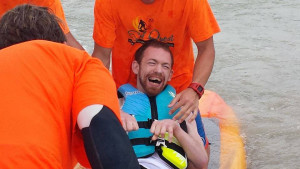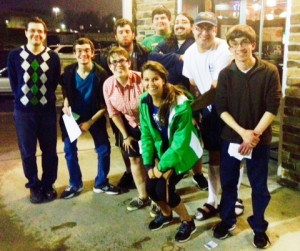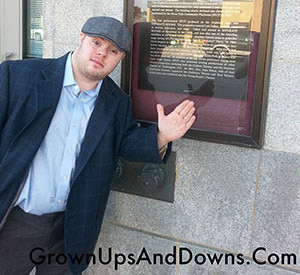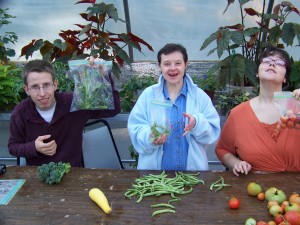Catching Some Waves With The Arc of the St. Johns
Innovations in programming at The Arc of the St. Johns in St. Augustine, Florida, are most often driven by specific needs and interests identified by the individuals they serve. That, of course, calls for listening, understanding, and the flexibility to step outside the norm.
 The individuals there enjoy an active learning curriculum, with rotating classes in computer proficiency, culinary and health, structured physical education, arts and crafts, and Adult Basic Education in cooperation with the community college in St. Augustine. Children with special needs have the Therapeutic Learning Center, and young adult age 18 to 22 attend the St. Johns Community Campus, both charter schools.
The individuals there enjoy an active learning curriculum, with rotating classes in computer proficiency, culinary and health, structured physical education, arts and crafts, and Adult Basic Education in cooperation with the community college in St. Augustine. Children with special needs have the Therapeutic Learning Center, and young adult age 18 to 22 attend the St. Johns Community Campus, both charter schools.
Andy, a client of the chapter, has always been a curious and adventurous soul. The twenty-six year-old sees every class as a fresh and productive opportunity to experience and achieve very measurable objectives, most for the very first time. These therapeutic exercises are helping to train his hands and arms to stir a pot full of beans in Culinary Class, and to operate his own Facebook page in computer class, aided by an ocular directed mouse.
St. Augustine is an active coastal community in Northeast Florida, and The Arc of the St. Johns has seen a void as many men, women and children with intellectual and developmental disabilities (IDD) were missing the opportunity to enjoy the ocean and connect to a caring and sharing community of avid surfers. In response to the obvious need, and the urgings of Andy and his friends, The Arc created Surf Quest, a free monthly event with trained and enthusiastic volunteers who introduce adaptive aquatic recreation using specialized surfboards and flotation devices for anyone with a disability. The Surf Quest season opened in March 2015 and will culminate with the Black Ties and Board Shorts Awards Banquet in September.
 Andy truly captured the hearts and attention of the entire crew of trained and experienced volunteer coaches, virtually all of whom had little or no experience or interaction with individuals with IDD. “Andy’s Crew” found the way to get Andy into the surf and on to a surfboard for a half-dozen rides. Jordan is his ride-along, and said, “Andy’s courage and effusive enthusiasm touched all of us, and we feel the same way about every one of these guys. We’ll be here for every event.
Andy truly captured the hearts and attention of the entire crew of trained and experienced volunteer coaches, virtually all of whom had little or no experience or interaction with individuals with IDD. “Andy’s Crew” found the way to get Andy into the surf and on to a surfboard for a half-dozen rides. Jordan is his ride-along, and said, “Andy’s courage and effusive enthusiasm touched all of us, and we feel the same way about every one of these guys. We’ll be here for every event.
As for Andy, he has gone back to the computer to edit his video, adding a Beach Boys soundtrack. He has also created his shopping list for new wardrobe essentials for the next Surf Quest event: Some cool Ray Ban sunglasses, a pair of wild flower-print board shorts with a matching tank top, and a big, big, fluffy towel.
Find Andy’s action video on Facebook: Surf Quest – The Arc of the St. Johns. And, visit The Arc of the St. Johns website, www.arcsj.org.





 A few years ago, Schenectady County Public Health Services and
A few years ago, Schenectady County Public Health Services and  While the vegetables were being grown, nutrition educators from Cornell Cooperative Extension of Schenectady County (CCESC) conducted a six-week program adapted to the specific needs of individuals with IDD. This training provided participants and staff with strategies regarding healthy meal preparation practices and how to incorporate vegetables into daily meals and snacks.
While the vegetables were being grown, nutrition educators from Cornell Cooperative Extension of Schenectady County (CCESC) conducted a six-week program adapted to the specific needs of individuals with IDD. This training provided participants and staff with strategies regarding healthy meal preparation practices and how to incorporate vegetables into daily meals and snacks.





